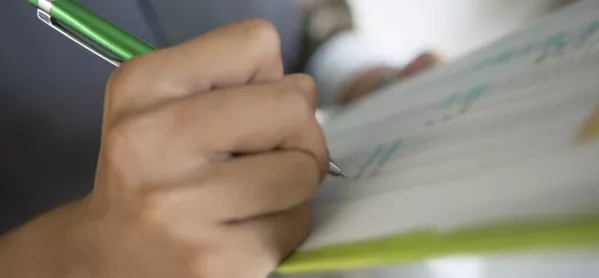- Home
- ‘I cheat the education system and I hate myself for it’
‘I cheat the education system and I hate myself for it’

Every now and then, teachers are presented with a serious moral choice - between doing what is right and doing what is right by Ofsted.
I mark my books often and they look beautiful. It’s OK; I don’t have kids or an active social life so I have time to do it. In fact, I have perfected a system of gluing in worksheets that are guillotined down to size so that they segment topics into a coherently-structured, colour-coded and fully differentiated system while also allowing me the flexibility to update, improve and modify them on a lesson-to-lesson basis.
They look fantastic and certainly cut down the opportunities my students have to mess up their own books. Does that help them make better progress? Nah!
Pearls of wisdom have limited impact
My students do a reflection and response (R&R) activity in purple pen after every piece of extended writing, which, if sub-par, is repeated. My students hate R&R; to a normal person, this means ‘rest and relaxation’, but here it is yet another method that tortures them by having to respond to my feedback (responding to anything is pretty alien to the teenaged brain). However, we do it because it makes me look good.
To avoid the “OK” and “thanks Miss” responses, I have created a bank of intelligent comments that students are directed to copy so they can, apparently, make rapid progress. They copy them straight off the board with not too much thought or proper realisation that implementing such pearls of wisdom will actually help them.
Sometimes I read them back to them before commencing another exercise but many will still make the make the same errors. They are not robots and their memories are not perfect. Copying out the correct spelling of a word three times in the margin is no proof the student now knows how to spell it correctly.
Oh, and the students whose work is poor? I photocopy a good piece of work and make them copy it out and then remark on it, congratulating them on their outstanding and rapid progress and thanking them for their extra effort and pride in redoing this work, which they were forced to do by me to save my bacon from awkward questions at book scrutinies. Is it actually good progress? Of course not!
I even have a designated board in my classroom for displaying the most recent best work of each of my classes, which I will invite our soon-to-be-expected Ofsted inspector to sit opposite. All the pieces are presented beautifully, all are marked and R&R-ed, all demonstrate amazing progress. My act is better choreographed than Britain’s Got Talent!
And it doesn’t end there. Before Easter, I ran a test with my Year 10 classes. One group did well; nearly all of them met or exceeded their target. I printed out the colour-coded spreadsheet and have included it in the pack I will give to our important visitor.
The other class? Not so great. But, if I do a little tweaking and use the 2015 grade boundaries instead of 2016, the data looks better. No-one will know. It is only a difference of a couple of percent.
‘The students don’t think’
See where I’m going here? Do you see what we are driven to in order to protect our reputations? Do you see why measuring schools on attainment data alone just opens the floodgates for unreliable statistics?
In our Ofsted preparation frenzy we were alerted to some of the questions inspectors might ask our students in lessons, such as “do you feel you are sufficiently challenged in this lesson” and “can you show me in your book where your teacher helped you to make progress”?
I created a template that asked these very questions to our students. I now issue it to them at the end of each unit so they can pinpoint exactly how, where and when they “got better”, ready for whoever whips out his or her clipboard and attempts to find out what our students really think.
But our students don’t think. We do it for them.
We’re so ready for Ofsted I almost pity them for the ruse we are pulling off here. Do I congratulate myself on my guile? Does this mean I can finally start believing I’m a great teacher now? No, I just feel a bit dirty and ashamed of myself.
I am essentially propping up this ridiculous system by slyly making myself look good to preserve my career in a job I still (most of the time) love, instead of focusing on what really matters. The kids, my colleagues, the spirit, creativity and freedom of a good education for all, free from pressure, progress grades, skewed accountability measures and, of course, cheats like me.
The author is a secondary teacher in the northeast
Want to keep up with the latest education news and opinion? Follow Tes FE News on Twitter, like us on Facebook and follow us on LinkedIn
Keep reading for just £1 per month
You've reached your limit of free articles this month. Subscribe for £1 per month for three months and get:
- Unlimited access to all Tes magazine content
- Exclusive subscriber-only stories
- Award-winning email newsletters



